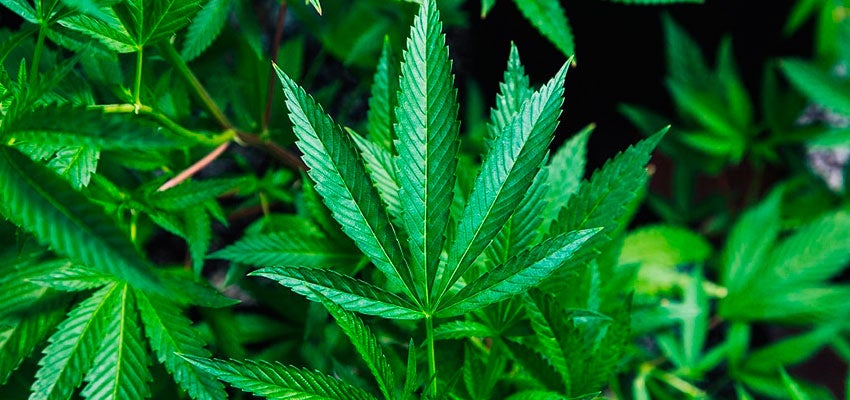NEW CROP FOR COVINGTON?
Published 1:07 am Tuesday, April 23, 2019

- The 2018 Farm Bill changed the legal status of industrial hemp. But for now, it can only be grown in Alabama with a permit from the Alabama Department of Ag and Industries. There are 152 licensed growers in Alabama.
Ibidapo hopes growing hemp will lead to a gold rush of sorts in the South
Matthan Ibidapo’s ultimate goal is to turn the South into the Silicon Valley of hemp.
 Ibidapo, the CEO of Cannabis South, is one of only 152 licensed growers of hemp in Alabama, and one of only three in Covington County. The 2018 Agriculture and Nutrition Act, commonly known as the Farm Bill, changed the legal status of hemp from a controlled substance to an agricultural commodity. But until the USDA develops regulations for growing hemp, Alabama growers must be licensed through the state Department of Agriculture.
Ibidapo, the CEO of Cannabis South, is one of only 152 licensed growers of hemp in Alabama, and one of only three in Covington County. The 2018 Agriculture and Nutrition Act, commonly known as the Farm Bill, changed the legal status of hemp from a controlled substance to an agricultural commodity. But until the USDA develops regulations for growing hemp, Alabama growers must be licensed through the state Department of Agriculture.
Hemp is valued for its fiber, which can be used to make rope. Stalks and seeds can be used to make fabric, fiberboard, carpeting, insulation, livestock feed and automobile components. Hemp can also be the source for cannabidiol, or CBD oil, which some people use as a treatment for physical ailments.
Ibidapo came from a humble beginning, with both parents immigrating to the United States from Nigeria.
“My parents got the opportunity to come to America by chance,” Ibidapo said. “They won the individual lottery in Nigeria and decided to come to America. Everyone outside of the United States knows how good of an opportunity it is to be able to come to the United States and have a child and raise them with opportunities that they never even dreamed of. I mean to have us here was their ultimate goal. We ended up going to back to Nigeria for about six or seven years, but the difference was, I had an escape. I could come back to the U.S.”
He made his way back to the United States, graduated from Riverdale High School in Atlanta, Ga., and attended Alabama State University in Montgomery.
“Alabama State adhered to all of the values that I held myself to,” Ibidapo said. “Going to college was critical in my life, because I could have stayed in Atlanta and stayed into what I was seeing with the incarceration rates going up, people being arrested for the possession of cannabis or trying to sell it and the violence there. So, going out of state taught me that life isn’t about money or material things.”
In 2013, Ibidapo realized that he could either stay in social work and work a nine to five job, or make a change in his life.
“I was up reading, which is what I do every morning, I just research,” Ibidapo said. “And I came across two states that were going against the status quo, Denver, Colorado and California. They were telling the government that this is what we are going to do with the cannabis situation. They were telling the government this is how we are going to serve our people. We are going to provide our people with the byproducts from this plant that they need, because our government is incarcerating people recklessly. So, in that essence, I started studying on what I could do, because now it wasn’t going to be like the black market, it was going to be like actually going into board meetings and starting a business.”
Ibidapo said he equates the hemp industry to the California gold rush or finding oil.
“After I graduated, I told myself that it was do or die,” Ibidapo said. “I could go back to Georgia, get a job and work a nine to five, pay off student loans, get a car and just fade away or I could tackle something that in the olden days would be like the gold rush or finding oil. All that was going on during the reconstructive era is the same exact thing that is going on right now with this plant.”
Ibidapo is one of three individuals or corporations licensed to farm hemp in Covington County.
“My father-in-law has a farm in Andalusia,” Ibidapo said. “So I talked with him and he was willing to let me, so I took the opportunity. He didn’t think that it would ever happen, but when the program came through at the end of last year, early this year, I knew that God had presented me with an opportunity to do this in Alabama rather than Georgia, because over there it is ridiculously expensive to start this. I believe that Covington County and Andalusia will be a place that will allow me to set up that hub of activity where I can work with other people and universities.”
According to Alabama Department of Agriculture Commissioner Rick Pate, the next step for farmers is to purchase hemp seed, which costs about $1,000, and plant it.
“We have to give the certification to get the seed,” Pate said. “It can’t come into the state without a certification from us.”
Although marijuana is a type of hemp, industrial hemp contains far smaller amounts of THC, the intoxicating substance in marijuana.
“It’s industrial hemp,” Pate said. “It doesn’t have the THC. If you tried to smoke it, you’d get sick as a dog before you got high. It has no value to smoke it or use for hallucinogenic purpose. It’s a different species (than marijuana).”
Ibidapo believes that the South will be able to produce companies that will help with the unemployment rate all thanks to hemp.
“I believe that there is no better place to start than in Alabama,” Ibidapo said. “Especially in Covington County and in more rural communities. We can make the South known for the industrial side of the hemp plant. We can work with these universities and research all of the benefits of this plant. We can help these farmers that are depending on it.”






